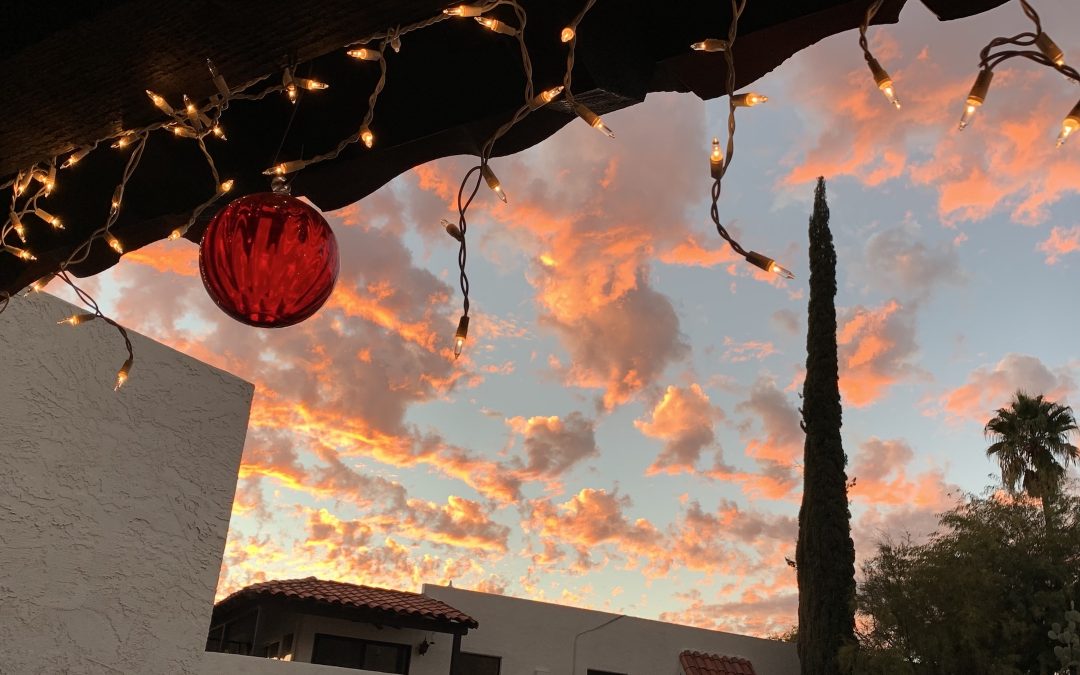A few months ago, Ed and I sat on the back patio of our winter home in Tucson, Arizona, watching the changing tones of red and purple of the setting sun against Sabino Canyon, and reflecting on our life in the desert.
“One of the best parts about spending winters in Tucson is that we finally can celebrate Christmas in a way that works well for both of us,” he said.
Ed and I have always been a mismatch when it comes to celebrating Christmas. Everything I love about the holiday, he loathes. We are hardly unique in this regard. A stress expert at the University of Manchester has said that 80 percent of couples share our Christmas-incompatibility.
So for the past five years, we’ve tried something different. We have moved away from close friends and family in the winter. On Christmas day, we have volunteered at homeless shelters. For Christmas dinner, we started a tradition of the two of us sharing a great meal at our favorite Indian restaurant. A few days after the holiday, our two grandsons have come to visit.
And it’s been OK.
“Works well?” I asked, staring at him. Did he really think that this arrangement of ours during the Christmas holiday worked well for me? I thought we were doing this to keep peace in the marriage. Not because it worked well.
I was shocked by his words, and Ed was taken aback by my strong reaction. Let me just say that it was not a peaceful evening, the two of us watching the setting sun against our canyon!
Ed and I have been together for nearly thirty years. He knows me better than anyone else, far better than anyone ever has. So I assumed he knew everything about me. Certainly about how I feel regarding Christmas without close friends and family.
Many relationship experts argue that it doesn’t matter how long or how intimately people have known each other. No one can ever truly know another, they say, because often we keep certain things from the other. According to such experts, there will usually be something that goes unsaid, a hidden shame, a private dream, an unfulfilled desire and the like. And it remains unknown.
I’ve heard it said that we all have at least three faces:
1. The face we show the world
2. The face we show to family and close friends
3. The face we never reveal to anyone
But Ed knows all of my faces, including the face I have revealed to no one else. So there must be other reasons besides unshared secrets that prevent us from truly knowing one another.
Here’s my take on this.
On the patio that night in the Arizona desert, Ed and I were experiencing what psychologists call the illusion of transparency. Because of a natural egocentric bias, people often rely too heavily on their own perspective when trying to understand the views of others.
So even the person who knows me better than anyone else nevertheless sees me through his own lens, with his own biases: Isn’t it wonderful to spend Christmas without all of the hoopla?
This also causes me reflect on the many ways I project my own biases onto my understanding of my husband. Do I truly know him? Or am I only able to know those things about him that make sense to me, given my own experiences?
I can’t escape my biases. But I can become more aware of them and their effects. I can stop making assumptions about what I think I know, reducing the illusion of overconfidence this creates.
Ultimately, relationships probably don’t break because one person fails to know the other. They most likely break because we make false assumptions, and fail to adjust our understanding based on new information, over and over again.
Oh, and about the Christmas thing? Ed and I are trying a new experiment this year. We’re returning for the holiday to Oregon, to be near close friends and family. It’s truly an experiment because I may find I prefer the simplicity of our desert holiday tradition after all; and Ed may find that Christmas festivities with friends and family aren’t as onerous as he thought.
Because truly knowing even ourselves often requires adjusting who we thought we were based on new information about ourselves, over and over again.


Our experiment this Christmas is probably not as simple as it may first appear. As Marlena points out, truly knowing even ourselves often requires adjusting who we thought we were. For example, to the degree that I bring my negative point of view about Christmas festivities with me while I am engaged in this year’s festivities, it will be very hard for me to see them newly. Being aware of how my biases influence my experiences is a first step in the right direction.